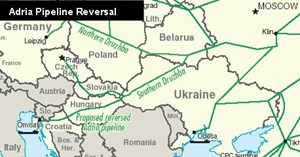Russia, Poland set goal to restart oil pipeline as tensions linger
WARSAW (Bloomberg) -- Although compensation for damage caused during a contamination crisis remains a sticking point, Russia and Poland said flows of clean oil through the giant Druzhba pipeline into Europe could resume within 2 1/2 weeks.
Transneft PJSC, Russia’s state crude oil pipeline operator, said uncontaminated barrels can flow into Poland by June 9-10 if interested parties implement a restart plan on Friday. PERN SA, its Polish counterpart, said claims for compensation from oil refiners must first be acknowledged if the deadline is to be met.
Their comments came shortly after more than 10 delegations -- including refinery officials from Germany and Poland -- met with pipeline and logistics officials in Warsaw. They were trying to thrash out issues that have left the main part of Europe’s biggest import pipeline halted about a month after the contamination crisis erupted.
Tainted crude
PERN said it has been mixing tainted Russian oil with supplies that haven’t been contaminated and supplying the blend to refineries. The dirty barrels are being put together with clean supplies from storage tanks or seaborne imports, Katarzyna Krasinska, a spokeswoman for PERN said. The decision to do so was taken in consultation with refineries, she said.
The Druzhba link was halted late last month after it emerged that organic chlorides, a pollutant that can damage refineries if processed, had entered into the system. While the southern leg of Europe’s biggest crude import link -- toward Slovakia, Hungary and the Czech Republic -- had already resumed with clean oil reaching Slovak territory on Thursday, the much bigger northern line remains down.
Poland’s Prime Minister Mateusz Morawiecki said Tuesday that negotiations are “very difficult, very tough,’’ calling for Russian companies to be held accountable for supplying oil contaminated with organic chlorides to local refineries.
Disarray
Crude flows from Russia, the world’s second-biggest oil exporter, have been in disarray since a tiny depot on the Volga river allegedly introduced the contamination via a criminal scheme about a month ago. Transneft stranded tens of millions of barrels of dirty crude throughout the system, causing disruptions at refineries from Belarus to Germany.
Germany isn’t receiving crude via pipeline from Russia and even when the Druzhba pipeline has restarted it will take two to three weeks for untainted supplies to reach the country, a spokesman for German oil industry group MWV said by phone. Its members include the nation’s refiners.
No shortage
There’s no shortage of fuel in Germany because of continuing reduced output at refineries using seaborne crude imports, stored barrels, as well as transfer of fuel supplies from western Germany to east via truck, he said.
Russia “has implemented a number of measures needed to resume deliveries as soon as possible,” via the northern link of the Druzhba pipeline to Adamowo-Zastawa in Poland, the Russian Energy ministry said Wednesday.
Oil flows could be restored “very quickly,” said Daniel Obajtek, CEO for Poland’s biggest oil refiner Orlen. Polish and German refiners need to divide up responsibility for the contaminated oil currently in the countries as well as discuss compensation for potential damage with the Russian side.
Russia has resumed supplies via a southern link of the Druzhba line, pumping about 170,000 bbl of clean crude daily, according to a Russian official familiar with the situation, who asked not to be identified because the information was not public.
Crude of a “required” standard has started to arrive at a refinery in Slovakia, according to Slovnaft, which operates the facility.
Typical flows are about 270,000 bpd when the link is fully operational, according to CDU-TEK data compiled by Bloomberg.
Production impact
The contamination crisis, which shut down part of the Druzhba link over a month ago, is seen eroding Russian oil production.
The nation pumped 11.151 MMbopd between May 1 and May 20, according to calculations based on the Energy Ministry’s CDU-TEK statistics seen by Bloomberg. That’s down from 11.233 million barrels a day in April and below the target of 11.19 MMbopd under the OPEC+ agreement.
The ministry didn’t immediately comment on whether the dirty-oil crisis affected production.



